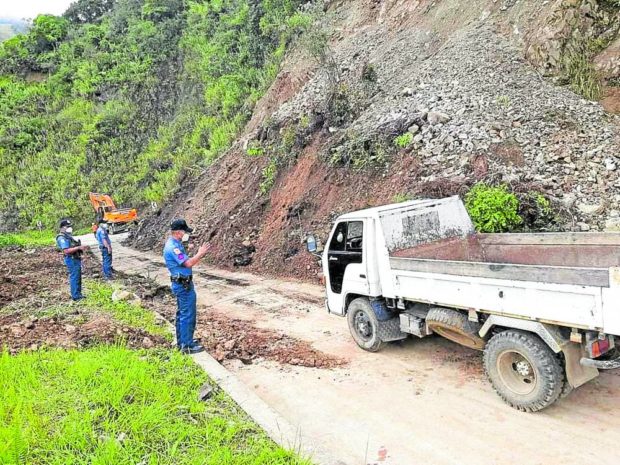Roadworks, lack of drainage blamed for Ifugao flash floods

REOPENED Policemen in Banaue, Ifugao province, on Tuesday assist motorists through a reopened section of the Banaue-Hungduan-Benguet boundary road. A landslide blocked the road during heavy rain on July 7. —PHOTO COURTESY OF IFUGAO POLICE
BAGUIO CITY—The flash floods that struck a large area of the tourist town of Banaue in Ifugao province early this month were caused by unusually high volumes of runoff rainwater, which natural waterways and mountain road drainage systems were unable to contain, officials of the Department of Environment and Natural Resources (DENR) said on Wednesday.
At a press briefing here, Ralph Pablo, DENR Cordillera director, said the volume of rainwater at 3 p.m. on July 7 was 4.8 millimeters, but increased to 19.8 mm an hour later based on the rainfall measurements released by the National Irrigation Administration.
Slope failure
Heavy and prolonged rainfall “oversaturated” the mountains, causing landslides that blocked three roads, said geologist Fay Apil, Cordillera director of the Mines and Geosciences Bureau (MGB), at the same briefing.
Slope failure occurs when the soil could no longer shoulder the full weight of rainwater, Apil said.
But she said insufficient drainage caused runoff water to roll down the pavement because of constricted canals and waterways due to houses built by the roadsides. These roads relied on street gutters, which were not designed for high volumes of water.
Article continues after this advertisementWorse, construction materials and debris from ongoing road projects and slope protection activities were dragged by floods, causing far more damage, Apil said.
Article continues after this advertisementPablo, a civil engineer, said he saw a pattern linking road-widening projects to Cordillera calamities.
“Government contractors start breaking up mountainsides and widening mountain roads during the rainy season,” he said.
“When you break the foot of the mountain, of course, it will topple,” he said.
According to him, project contractors and workers continue pouring concrete even during torrential rains to beat deadlines.
Such practice, he said, only creates voids in the pavement because “the concrete is not properly compacted and becomes fragile.”
Public and private construction schedules would have to change given the extreme weather brought about by climate change, Pablo said.
Apil said the MGB and local governments would review the natural and man-made drainage networks serving all Cordillera towns following the recent flash floods in Banaue.
“Whenever we travel [through the region during the rains], we observe the roads turning into rivers … so let us go back and review all the drainage systems,” she said.